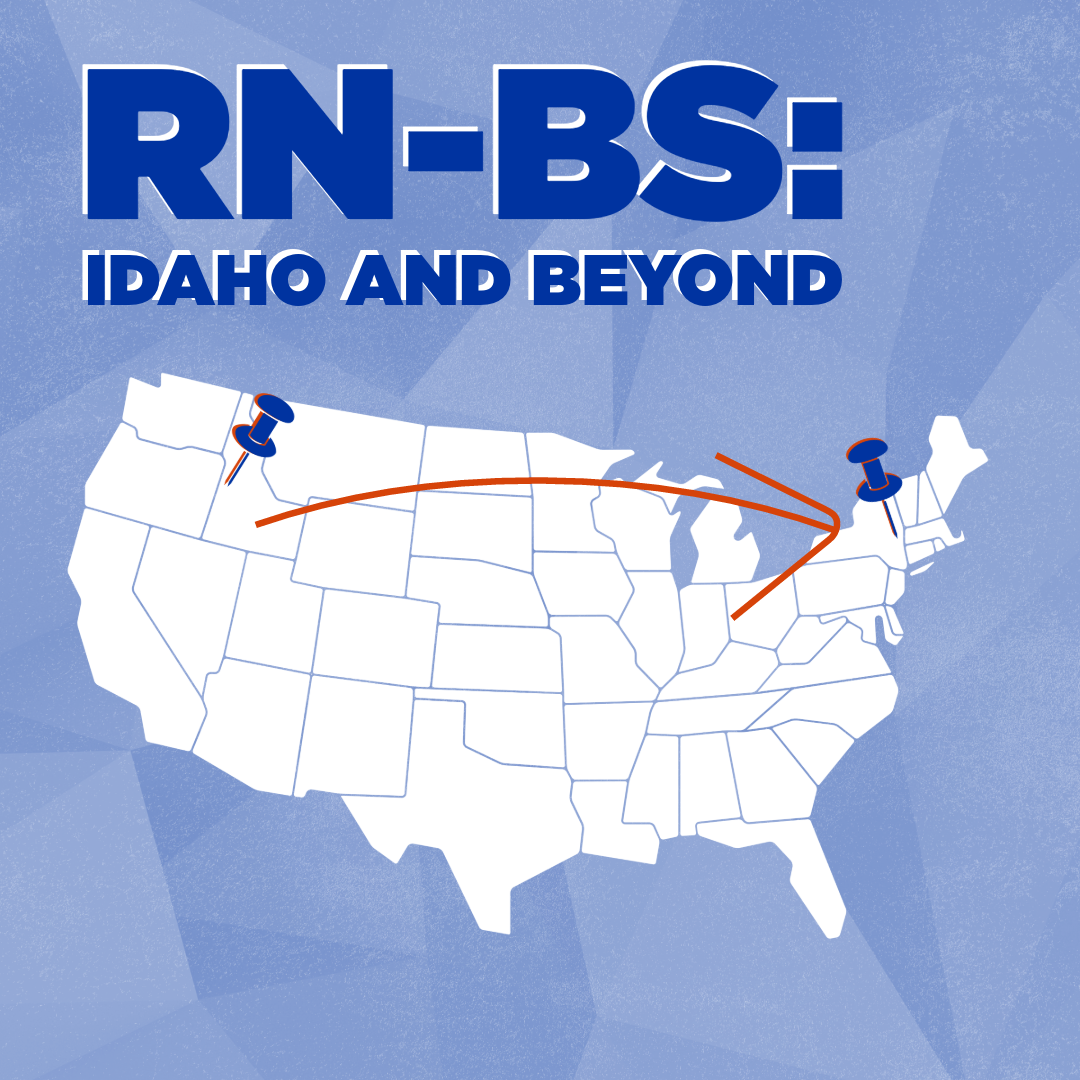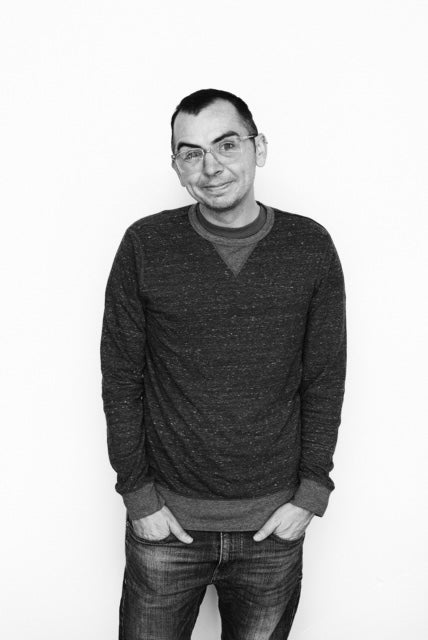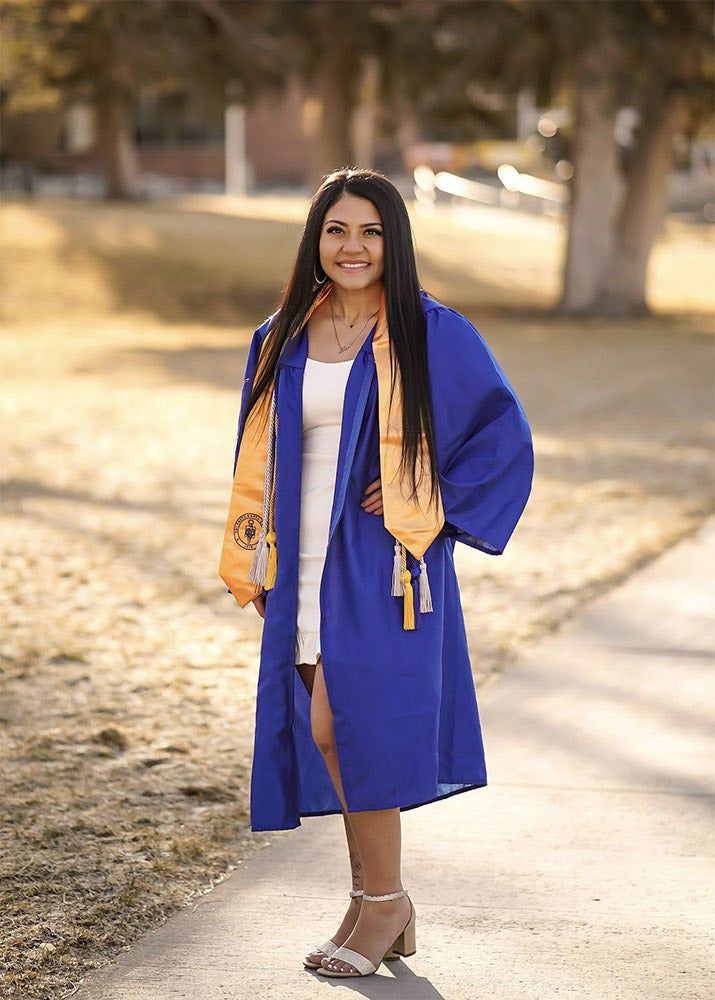Potatoes. Blue turf football field. Nursing?
If you’re on the east coast, these might be your thoughts about Boise, Idaho. But if Idaho is the Gem State, Boise State University is the hidden gem of nursing education. With a top-ranked on-campus nursing program and tailored graduate options, Bronco Nurses stand out.

You might not know we’re also experts in online education.
For the last 15 years, the School of Nursing has been helping nurses earn their bachelor’s degree no matter where they live. We’re developing America’s working nurses and supporting their well-being through tailored programming.
Students in the RN-BS Online Completion program say they love the program’s flexibility, as well as our supportive faculty and advisors. But don’t just take our word for it; hear it firsthand from our students across the nation.
Learn Firsthand from Two Students
EST
Tate Klacsmann
Tate Klacsmann lives in New York, a state that requires nurses hold their bachelor’s in nursing within ten years of licensure. “It’s not a matter of if you want to go back to get a bachelor’s, it’s just a matter of when,” he said.
Klacsmann browsed schools for a long time before deciding on Boise State. He wanted a recognizable state school with a well-known on-campus program.
“Boise State’s been around a long time, which I think is helpful,” he said. “It does have a really good reputation.” And like many people deciding to return to school, finances played an important role, too.
“It quickly became clear that I needed a school that either offered in-state tuition for me or was location neutral – which Boise State is – where everybody gets in-state tuition,” he said.

Klacsmann holds one bachelor’s degree already and wanted a straight answer from potential schools about their required credits. But many schools don’t distinguish these, offering to review his transcripts only after he’d been accepted. Many other schools weren’t clear about what he would actually need to graduate, “and I love that Boise State was very transparent about that,” he said.
In addition, Klacsman loved that he could dual-enroll, thinking that if he could even get one class out of the way, he’d feel better about continuing his bachelor’s after his associates. Klacsmann is currently earning his associates degree in nursing (ADN) through SUNY Columbia-Greene Community College.
As he saw it, finishing his associates degree after three-and-a-half years only then to begin a bachelor’s program would be like climbing to the top of a mountain and then finding out there’s a second mountain to climb right after. It was a psychological hurdle he didn’t want to have to jump, so he dual-enrolled.
“So it’s like, ‘Okay, I could go to this awesome school that has everything I’m looking for, and it’s going to cost me less than my own in-state tuition.’ Yes, please!”
Challenges and rewards
One aspect of the program that has lived up to Klacsmann’s “happiest expectations” is his interactions with his advisor, Maura Rasmussen.
“I feel like I have bugged her many times throughout this program, and she’s always gotten right back to me and been really helpful,” he said. “She gave me very good advice about everything that I asked her about and needed help on. Her advice always turned out to be spot on.”
Another pleasant surprise was his healthy aging course, since the material is “not really emphasized at the associate’s level,” he said. “I didn’t have negative expectations, but I just didn’t have any expectations. I didn’t know what I was getting into, and I ended up really liking that course.”
What’s been most challenging, Klacsmann admits, is the research course. Learning to apply APA citations and formatting was overwhelming and disorienting at first.
But he now happily reports, “I learned quite a bit in that class.”Tate Klacsmann
He ended up emailing his professor asking for a point-by-point review of his mistakes and how to correct them, which he found so instructive he “actually used to refer to that email” any time he couldn’t recall how to do it, he said. “We don’t do a lot of research at the associate’s level, but anytime we do, I cite my things all correctly and my professors are always extremely impressed.”
Given that this is his last semester, Klacsmann has been preparing for the NCLEX – the national licensing exam for registered nursing. Taking practice tests has also been rewarding as he discovers a new sense of confidence in his knowledge of the material.
“I always feel like there’s so much to learn,” he said. “You do so much work, and then to finally get to the test review and see it, like ‘Oh yeah, actually I do know that!’ It’s very rewarding.”
MST
Alissa Godinez
Alissa Godinez lives in Idaho and is in her final semester of the program. She earned her ADN from the College of Eastern Idaho and chose to pursue her bachelor’s through the RN-BS program.
“I wanted to stay local, and then on top of it, I really wanted to make sure I was going somewhere that was either AACN or CCNE accredited.”

Accreditation can seem difficult to understand, but really it’s a just mark of high-quality education from institutions with excellent reputations. If you earn a degree from a school that isn’t accredited, and then try to continue your education at another school, those credits probably won’t be accepted.
Godinez knew she wanted to go on to graduate school after earning her bachelor’s, so she selected Boise State with an eye to the future. “For me that was the biggest thing, because no [nurse practitioner] program will take you without AACN or CCNE accreditation,” she said.
Godinez took advantage of the option to dual-enroll while completing her ADN. While higher education can seem full of red tape and hoops to jump through, she found the transition into dual-enrollment “so simple,” she said. “I did my application, I sent my transcripts over and then got an email that was like ‘Great, okay, you can register for classes.’ It was the easiest thing ever.”
Godinez is also a recipient of the Tracy and Maura Rasmussen Online RN-BS Memorial Scholarship, which she learned about through an advisor’s post in the RN-BS communication center dashboard.
“They are constantly posting scholarship opportunities, which is really nice,” she said. “With scholarships, traditionally I’m so used to having to deep dive for them, but they literally give you everything you need and you just have to take the time to do it.”
Managing time and finding support
In addition to dual-enrollment, Godinez has also been working full time. Although the workload has been tough, “there was never a time at any point that I was like, ‘There’s no way I could do this’,” she said. “The greatest factor is learning how to master time management, but really, it’s totally doable.”
Her biggest piece of advice to anyone considering the program? “Sit yourself down and know your limits, and really learn to discipline yourself before you take it on,” she said.
Godinez found it most helpful to map out her coursework in a daily agenda so she knew how her time would be divided between school, work and family. Then she openly communicated with her family members and employer so everyone was on the same page about her responsibilities, which proved to be a helpful part of her support system.
“It’s been really nice to have that support externally because then you just feel like you can do it; it gives you just a little bit more motivation,” she said.
“Everyone in the RN-BS program is so supportive, too.”Alissa Godinez
Godinez appreciated the program’s flexibility, choosing to take as many classes as she could over the summer even though that’s typically a season of relaxation. “Don’t get me wrong,” she said, “It kind of sucked. But then again, it was kind of like, ‘How badly do you want this?’”
“For me, I wanted to get it done because I wanted to apply for graduate school at this point. So I needed to get it done.”
Looking back, she now considers the ability to complete the program in only a year-and-a-half the most rewarding part of it all.
She is especially thankful for her advisor, who Godinez says always promptly replies to her questions and makes things easy to understand.
“Even though it was all remote, I felt like the communication was just as good as if it was in person,” she said. “I think the team that we have for the RN-BS program is great; they’re very helpful. I think it’s just a matter of getting the answers to your questions, and they’re there to answer it. I wish I could tell everyone who’s on the verge of wanting to do this, just ask! …Your advisor will be very transparent with you, it’s just a matter of just asking and taking that next step.”